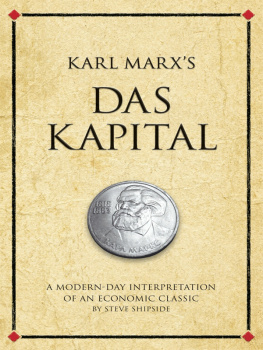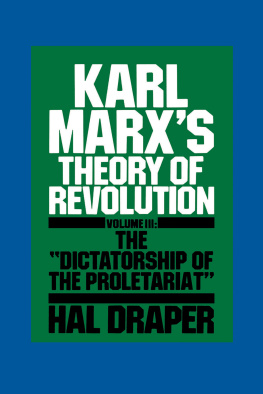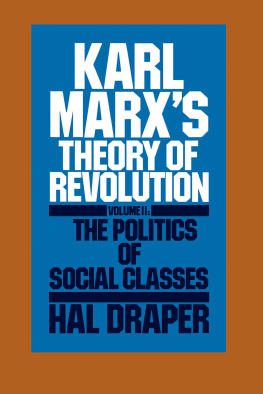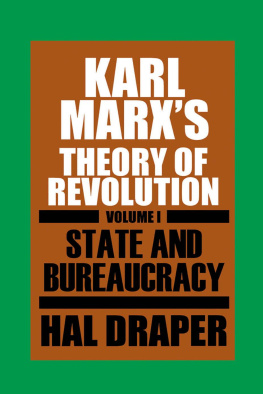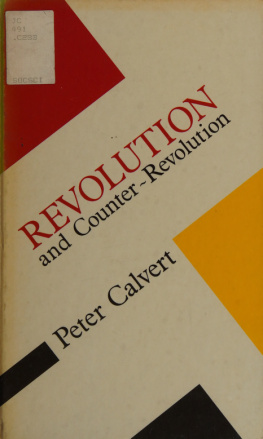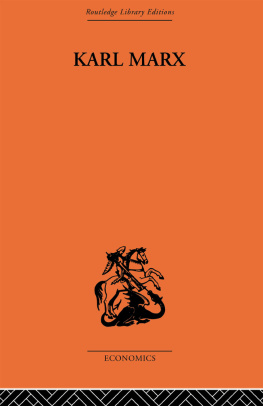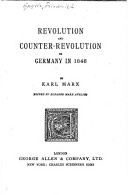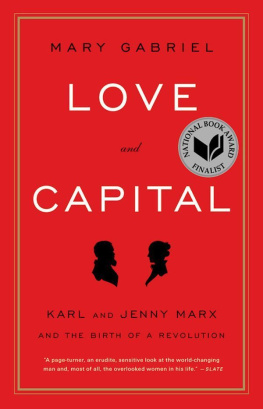Marx Karl - Revolution and Counter-revolution
Here you can read online Marx Karl - Revolution and Counter-revolution full text of the book (entire story) in english for free. Download pdf and epub, get meaning, cover and reviews about this ebook. genre: Science. Description of the work, (preface) as well as reviews are available. Best literature library LitArk.com created for fans of good reading and offers a wide selection of genres:
Romance novel
Science fiction
Adventure
Detective
Science
History
Home and family
Prose
Art
Politics
Computer
Non-fiction
Religion
Business
Children
Humor
Choose a favorite category and find really read worthwhile books. Enjoy immersion in the world of imagination, feel the emotions of the characters or learn something new for yourself, make an fascinating discovery.
Revolution and Counter-revolution: summary, description and annotation
We offer to read an annotation, description, summary or preface (depends on what the author of the book "Revolution and Counter-revolution" wrote himself). If you haven't found the necessary information about the book — write in the comments, we will try to find it.
Revolution and Counter-revolution — read online for free the complete book (whole text) full work
Below is the text of the book, divided by pages. System saving the place of the last page read, allows you to conveniently read the book "Revolution and Counter-revolution" online for free, without having to search again every time where you left off. Put a bookmark, and you can go to the page where you finished reading at any time.
Font size:
Interval:
Bookmark:
This eBook is for the use of anyone anywhere at no cost and with
almost no restrictions whatsoever. You may copy it, give it away or
re-use it under the terms of the Project Gutenberg License included
with this eBook or online at www.gutenberg.org
Title: Revolution and Counter-Revolution
or, Germany in 1848
Author: Karl Marx
Editor: Eleanor Marx Aveling
Release Date: June 24, 2010 [eBook #32966]
Language: English
Character set encoding: ISO-8859-1
***START OF THE PROJECT GUTENBERG EBOOK REVOLUTION AND COUNTER-REVOLUTION***
and the Project Gutenberg Online Distributed Proofreading Team
(http://www.pgdp.net)
from scanned images of public domain material generously made available by
the Google Books Library Project
(http://books.google.com/)
| Note: | Images of the original pages are available through the the Google Books Library Project. See http://books.google.com/books?vid=NokuAAAAYAAJ&id |
The following articles are now, after forty-five years, for the first time collected and printed in book form. They are an invaluable pendant to Marx's work on the coup d'tat of Napoleon III. ("Der Achtzehnte Brumaire des Louis Bonaparte.") Both works belong to the same period, and both are what Engels calls "excellent specimens of that marvellous gift ... of Marx ... of apprehending clearly the character, the significance, and the necessary consequences of great historical events at a time when these events are actually in course of taking place, or are only just completed."
These articles were written in 1851-1852, when Marx had been about eighteen months in England. He was living with his wife, three young children, and their life-long friend, Helene Demuth, in two rooms in Dean Street, Soho, almost opposite the Royalty Theatre. For nearly ten years they had been driven from pillar to post. When, in 1843, the Prussian Government suppressed the Rhenish Gazette which Marx had edited, he went with his newly-married wife, Jenny von Westphalen, to Paris. Not long after, his expulsion was demanded by the Prussian Governmentit is said that Alexander von Humboldt acted as the agent of Prussia on this occasionand M. Guizot was, of course, too polite to refuse the request. Marx was expelled, and betook himself to Brussels. Again the Prussian Government requested his expulsion, and where the French Government had complied it was not likely the Belgian would refuse. Marx received marching orders.
But at this same time the French Government that had expelled Marx had gone the way of French Governments, and the new Provisional Government through Ferdinand Flocon invited the "brave et loyal Marx" to return to the country whence "tyranny had banished him, and where he, like all fighting in the sacred cause, the cause of the fraternity of all peoples," would be welcome. The invitation was accepted, and for some months he lived in Paris. Then he returned to Germany in order to start the New Rhenish Gazette in Cologne. And the Rhenish Gazette writers had very lively times. Marx was twice prosecuted, but as the juries would not convict, the Prussian Government took the nearer way and suppressed the paper.
Again Marx and his family returned to the country whose "doors" had only a few short months before been "thrown open" to him. The sky had changedand the Government. "We remained in Paris," my mother says in some biographical notes I have found, "a month. Here also there was to be no resting-place for us. One fine morning the familiar figure of the sergeant of police appeared with the announcement that Karl 'et sa dame' must leave Paris within twenty-four hours. We were graciously told we might be interned at Vannes in the Morbihan. Of course we could not accept such an exile as that, and I again gathered together my small belongings to seek a safe haven in London. Karl had hastened thither before us." The "us" were my mother, Helene Demuth, and the three little children, Jenny (Madame Longuet), Laura (Madame Lafargue), and Edgar, who died at the age of eight.
The haven was safe indeed. But it was storm-tossed. Hundreds of refugeesall more or less destitutewere now in London. There followed years of horrible poverty, of bitter sufferingsuch suffering as can only be known to the penniless stranger in a strange land. The misery would have been unendurable but for the faith that was in these men and women, and but for their invincible "Humor." I use the German word because I know no English one that quite expresses the same thingsuch a combination of humor and good-humor, of light-hearted courage, and high spirits.
That readers of these articles may have some idea of the conditions under which Marx was working, under which he wrote them and the "Achtzehnte Brumaire," and was preparing his first great economical work, "Zur Kritik der Politischen Oeconomie" (published in 1859), I again quote from my mother's notes. Soon after the arrival of the family a second son was born. He died when about two years old. Then a fifth child, a little girl, was born. When about a year old, she too fell sick and died. "Three days," writes my mother, "the poor child wrestled with death. She suffered so.... Her little dead body lay in the small back room; we all of us" (i.e., my parents, Helene Demuth, and the three elder children) "went into the front room, and when night came we made us beds on the floor, the three living children lying by us. And we wept for the little angel resting near us, cold and dead. The death of the dear child came in the time of our bitterest poverty. Our German friends could not help us; Engels, after vainly trying to get literary work in London, had been obliged to go, under very disadvantageous conditions, into his father's firm, as a clerk, in Manchester; Ernest Jones, who often came to see us at this time, and had promised help, could do nothing.... In the anguish of my heart I went to a French refugee who lived near, and who had sometimes visited us. I told him our sore need. At once with the friendliest kindness he gave me 2. With that we paid for the little coffin in which the poor child now sleeps peacefully. I had no cradle for her when she was born, and even the last small resting-place was long denied her." ... "It was a terrible time," Liebknecht writes to me (the Editor), "but it was grand nevertheless."
In that "front room" in Dean Street, the children playing about him, Marx worked. I have heard tell how the children would pile up chairs behind him to represent a coach, to which he was harnessed as horse, and would "whip him up" even as he sat at his desk writing.
Marx had been recommended to Mr. C. A. Dana,[1] the managing director of the New York Tribune, by Ferdinand Freiligrath, and the first contributions sent by him to America are the series of letters on Germany here reprinted. They seem to have created such a sensation that before the series had been completed Marx was engaged as regular London correspondent. On the 12th of March, 1852, Mr. Dana wrote: "It may perhaps give you pleasure to know that they" (i.e., the "Germany" letters) "are read with satisfaction by a considerable number of persons, and are widely reproduced." From this time on, with short intervals, Marx not only sent letters regularly to the New York paper; he wrote a large number of leading articles for it. "Mr. Marx," says an editorial note in 1853, "has indeed opinions of his own, with some of which we are far from agreeing; but those who do not read his letters neglect one of the most instructive sources of information on the great questions of European politics."
Font size:
Interval:
Bookmark:
Similar books «Revolution and Counter-revolution»
Look at similar books to Revolution and Counter-revolution. We have selected literature similar in name and meaning in the hope of providing readers with more options to find new, interesting, not yet read works.
Discussion, reviews of the book Revolution and Counter-revolution and just readers' own opinions. Leave your comments, write what you think about the work, its meaning or the main characters. Specify what exactly you liked and what you didn't like, and why you think so.





